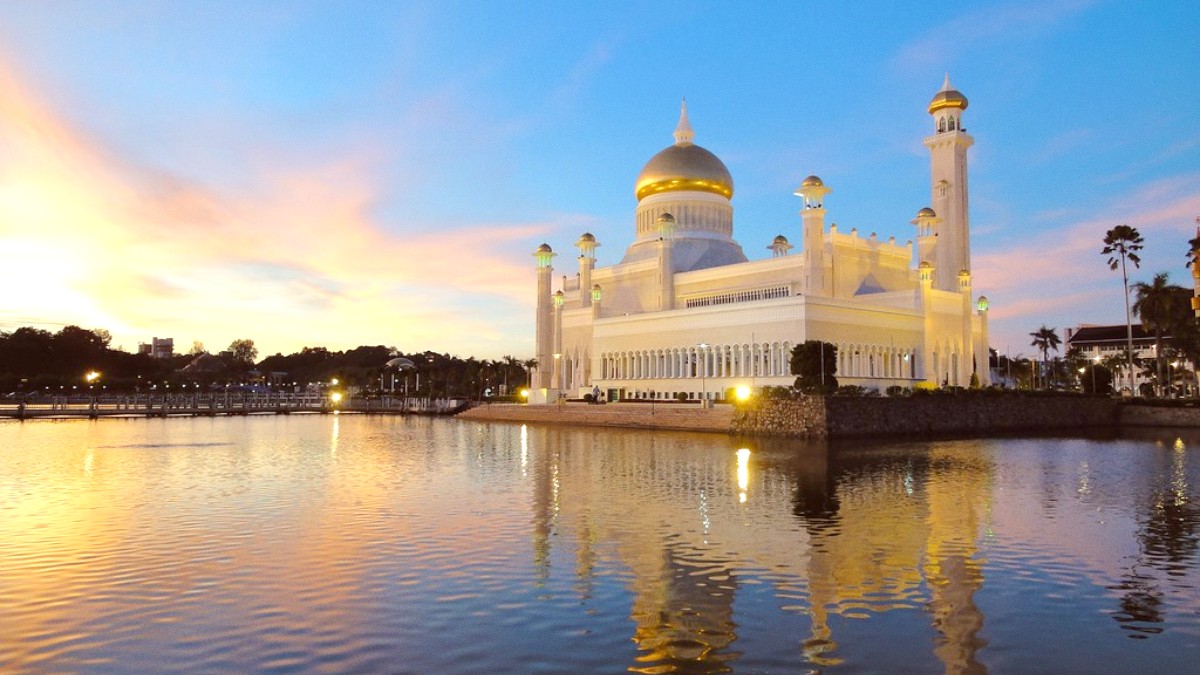
Brunei
The city is not just an urban area; green landscapes surround it. Dense rainforests and vast wetlands define the broader region. This natural boundary contrasts with the developed areas. It also has excursions into nature. The humid, tropical climate supports this abundant plant life. Visitors notice the constant warmth and moisture in the air. This environment shapes daily life and outdoor pursuits.
East of Bandar Seri Begawan lies the Temburong District, an exclave separated by Malaysian territory. The Sultan Omar Ali Saifuddien Bridge connects this district to the rest of Brunei. This modern structure spans 30 kilometers (18.6 miles) over water and marshland. It links directly to the unspoiled rainforests of Temburong.
Before its construction, travelers needed to pass through Malaysia or take a boat. The bridge simplifies travel to one of Brunei’s most treasured natural attractions, Ulu Temburong National Park. Its construction highlights Brunei’s commitment to internal connectivity and infrastructure. The bridge itself is a sign of modern engineering in the region.
Bandar Seri Begawan has served as the capital of the Sultanate of Brunei for many centuries. Its story joins directly to the Brunei Sultanate, a lineage dating back to the 7th century. This makes Brunei one of the oldest continuing monarchies globally. The Sultanate saw its golden age during the 15th and 16th centuries. At this time, it held sway over much of Borneo and parts of the Philippines. This historical depth gives the city an unique heritage.
The Royal Regalia Museum is a central place to learn about this rich history. It houses the regalia of the Sultan, including ceremonial armor, the royal chariot, and various gifts presented to the Sultan. Inside, visitors gain an appreciation for the monarchy's traditions and the nation’s journey. The museum presents artifacts that tell stories of past sultans and state ceremonies. It offers context for Brunei’s political and cultural landscape today.
Displays from state occasions.
Grand chariot used during coronation.
Presents received by the Sultan.
Insights into a long-standing lineage.
The country's progress through history.
The Sultan Omar Ali Saifuddien Mosque is a powerful symbol of Brunei’s deep faith and modern goals. Completed in 1958, this mosque features a prominent golden dome and marble minarets. It sits within an artificial lagoon, with a replica 16th-century royal barge floating nearby. The mosque is not just a place of worship but also a monument to national identity and Islamic architecture. Its design blends Malay and Italian styles, creating a structure that commands attention. Visitors often find its serene setting and grand appearance memorable.
The city’s growth mirrors Brunei’s transformation from a powerful maritime empire to a modern, oil-rich nation. The discovery of oil and natural gas in the early 20th century reshaped the country. This wealth fueled significant development, leading to modern infrastructure and high living standards.
This economic shift lets Brunei keep its unique cultural identity while presenting modern amenities. The city showcases both its ancient roots and its contemporary prosperity. This dual identity gives Bandar Seri Begawan a distinct atmosphere.
Bandar Seri Begawan is a long and rich history tied to the Brunei Sultanate, showing both ancient traditions and modern prosperity.
Bandar Seri Begawan has a clean and quiet feel. It does not possess the bustling pace of many other Southeast Asian capitals. The city has a calm atmosphere, often surprising first-time visitors. You find well-maintained public spaces and orderly traffic.
The city receives recognition for its grand mosques, royal palaces, and the traditional water village, Kampong Ayer. These attractions form the core of any visit. The mosques, with their golden domes and intricate designs, are architectural wonders. The palaces, while mostly private, signify the country’s monarchy. Kampong Ayer, known as the "Venice of the East," is a living testament to Brunei's past.
The country's economy relies heavily on oil and natural gas, funding infrastructure.
English is widely spoken alongside Malay, simplifying communication for visitors.
Islamic laws and customs guide daily life; modest dress is recommended.
The city operates under Islamic laws and customs. This guides daily life, dining practices, and public conduct. Brunei is a Muslim-majority nation. Visitors should observe local customs to show respect. This includes dressing modestly, especially when visiting religious sites or government buildings. Covering shoulders and knees for both men and women is good practice.